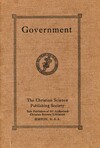

Are you sure?
This bookmark will be removed from all folders and any saved notes will be permanently removed.
The Democracy of Mind
Now that so much is thought and talked of the world being made safe for democracy, it is interesting to analyze just what is meant by such an assertion and by what methods the task may be accomplished. Pure democracy is unknown to the governments of the world to-day, although it may be found, in very nearly the exact expression of the word, in some of the cantons of Switzerland, and in certain New England townships. All students of history know that the word democracy derives from the Greek and means "rule by the people." In its Greek form, democracy originated as long ago as 594 B.C., when Solon, known as the founder of Athenian democracy, drafted laws by which he established a new code of equality for the people. At one time democracy was defined as mob rule or rule by the masses, a definition that has not been able to stand the test of time because such a classification fails entirely to take into consideration intelligence, and implies a rule by mere numbers, that utterly disregards the power of right idea.
With the passing of years, which is in reality the unfoldment of eternity, any conception of government undergoes a change, and it is not until democracy is seen as government by the one Mind that opposition to government will cease. The establishment, without contravention, of the rule of Mind and its expression, to be effective must be accomplished not by the sword or any human agency but through education in its highest sense. The phrase, making the world safe for democracy, generally conveys to people the thought that through the unrivaled prestige of those nations most nearly approximating individual freedom, the ideal of democratic government may be assured of never being overthrown by an attack of autocracy in any form of limited human control. And this is undeniably true, for the nations most nearly exemplifying the democracy of Mind can never be destroyed; the truth that they express is the power of spiritual idea against which the aggression of so-called reactionary forces is entirely futile. The machinery of government may be needed, but when recognized as the activity of Principle, it can never tyrannize, it can never crush out liberty of thought and action, it can never be other than truly democratic.
In "The First Church of Christ, Scientist, and Miscellany," beginning on page 246, Mrs. Eddy gives a definition of pure democracy which is applicable for all times and circumstances, and which, seen in its metaphysical aspect and demonstrated, will prove the millennium at hand: "The Magna Charta of Christian Science means much, multum in parvo,—all-in-one and one-in-all. It stands for the inalienable, universal rights of men. Essentially democratic, its government is administered by the common consent of the governed, wherein and whereby man governed by his creator is self-governed. The church is the mouthpiece of Christian Science,—its law and gospel are according to Christ Jesus; its rules are health, holiness, and immortality,—equal rights and privileges, equality of the sexes, rotation in office." This quotation is familiar to all Christian Scientists and is their ideal of democratic government—government "by the common consent of the governed," in other words, the consent of all those subject to the government. No one can be governed without his consent, a fact clearly recognized by Paul when he warned his hearers that they would be servants of that to which they yielded obedience, whether of sin or of righteousness. It is only the yielding obedience or consenting to the suggestions of error that allows the individual to be overwhelmed and controlled by the autocracy of sin and disease or false belief in any form. When recognizing the direction and guidance of Principle, manifested as the abundance of good, it can be said that one lives in the democracy of Mind.
Enjoy 1 free Sentinel article or audio program each month, including content from 1898 to today.
JSH Collections
This article is included in:
1921 - PAMPHLET
Government
JSH-Online has hundreds of pamphlets, anthologies, and special editions for you to discover.

March 19, 1921 issue
View Issue-
The Democracy of Mind
CLARISSE HALE
-
Grace and Gratitude
CLARKE F. HUNN
-
Our Rightful Heritage
HILDA MARY STEPHENSON
-
Loving Our Enemies
BERTINE L. STEERE
-
Good Citizenship
FREDERICK D. CULVER
-
Meditation
EDWARD O. AUGE
-
More than Conquerors
MARY A. MACOMBER
-
Obedience
CHRISTINE EMERY
-
"True humanhood'
Frederick Dixon
-
The Absolute Beginning
Gustavus S. Paine
-
At the time of my first healing in Christian Science I was...
Pearl L. Parker with contributions from Ella Heywood Smith
-
I am very grateful for all that Christian Science means...
John Henry Alexander
-
For many years I had suffered from nervousness and...
Nellie Seater
-
Some years ago, while still a member of a denominational...
Francis T. Smith
-
About six years ago I became afficted with what five attending...
Caroline A. Roehl
-
With thanks to God and gratitude to our dear Leader, Mary Baker Eddy,...
Edna Patterson McClelland
-
Words can only express in a very small measure what...
Myrtle Marden
-
To Him that Hath
EVELINE A. ELLIS
-
Signs of the Times
with contributions from Frederick Dixon, Perceval Frutiger, Foster Watson, Alfred Noyes, Sydney Olivier
-
Notices
with contributions from Charles E. Jarvis


